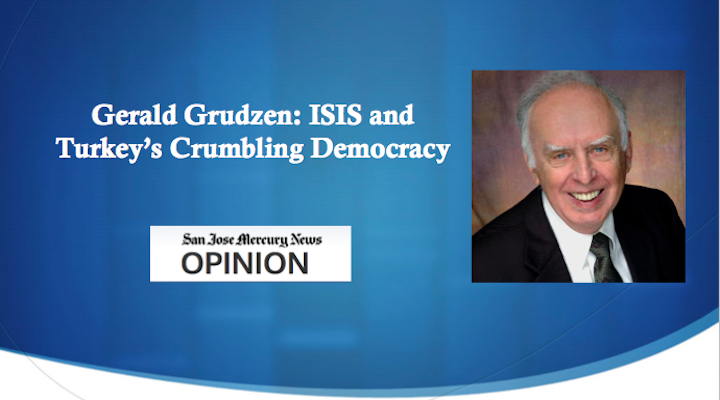By Gerald Grudzen, Special to the Mercury News
The terrorist attacks Paris and now Brussels continue to undermine the life of pluralistic societies in Europe and encourage ever more repressive policies toward Muslim immigrants who have fled the violence in Syria for the safety and economic opportunities in Europe.
Turkey’s agreement with the European Union to accept more Syrian immigrants comes with the promise of $3 billion of additional aid, but it may be a Trojan horse, given the growing authoritarian rule by President Recp Tayyip Erdogan.
Turkey has had a porous border with Syria and serves as a recruitment base for ISIS.
The primary organized group in Turkey representing a pluralistic understanding of Islam is the Hizmet (Service) Movement. The struggle for the soul of Turkey has involved the fate of Hizmet, which has been an international leader in education, interfaith dialogue and the promotion of human rights through an independent news media.
The founder of Hizmet, Fethullah Gulen, is a Muslim religious scholar who now resides in Pennsylvania. He has a large following throughout Turkey and the Turkish Diaspora.
In California, Hizmet has founded Turkish community centers throughout the state known as Pacifica Institute, including a local center in Sunnyvale. Hizmet has fostered a spirit of collaboration among religious leaders throughout the United States and has played a leading role in countering Islamophobia.
Given the present climate of paranoia about Islam found among some contenders for the 2016 presidential nomination, we need as many examples as possible of civic involvement by Muslim individuals and organizations to show that they are part of the fabric of American democracy and contributors to the civic health of the nation.
The seizure of Today’s Zaman, the largest English daily newspaper in Turkey, has been criticized by representatives of the European Union, The New York-based Committee to Protect Journalists and the US State Department. Until recently, Turkey was one of the few Muslim majority states in the Middle East with a vibrant democracy and a free press.
The U.S. and Turkey are part of NATO and presumed partners in the fight against ISIS and Al Qaeda affiliated groups. The violation of human rights by ISIS and al-Qaida are a large part of the reason that the U.S. has taken up the fight against these groups and sought the support of other nations in this struggle.
The U.S. must not fail to speak up against any violation of human rights, even among those aligned with us by the NATO treaty.
The growth of ISIS can be partly tied to the prevalence of authoritarian regimes in the Middle East that lack an appreciation of diverse forms of religious and political identities. One of the major partners in the fight against ISIS has been the Kurdish forces (YPG) in Syria aligned with the U.S. President Erdogan has attempted to demonize most Kurdish political and military groups as terrorists and more dangerous than ISIS. Kurds comprise as much as 20 percent of the Turkish population.
The European Court for Human Rights has highlighted the violation of Kurdish human rights in Turkey for decades. The U.S. cannot turn its back on the imprisonment of journalists and the attacks against our Kurdish allies in the fight against ISIS.
Turkey needs to show the millions of Syrian immigrants coming under its protection and surveillance a model of an inclusive and free society. This stands in stark contrast to the brutality and oppression found within ISIS.
Gerald Grudzen teaches in the Philosophy Department of San Jose City College. He wrote this for this newspaper.
Source: San Jose Mercury News

